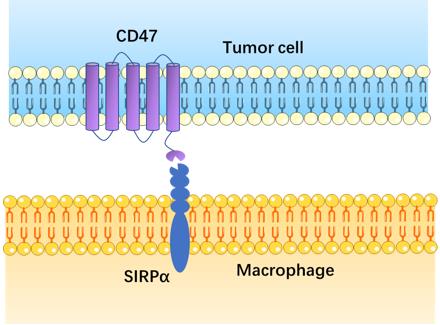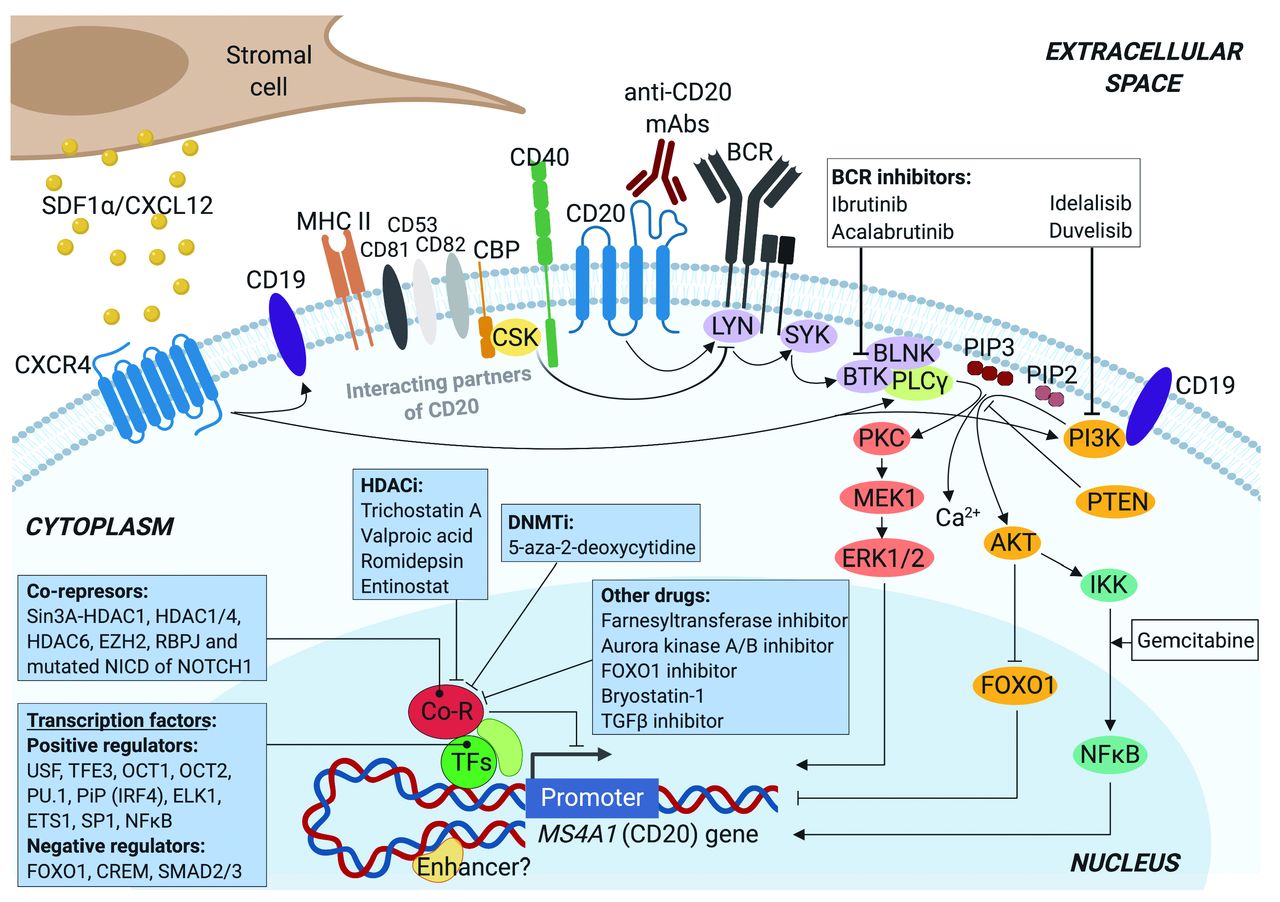Introduction of CD47
CD47, also recognized as integrin-associated protein (IAP) or cluster of differentiation 47, represents a transmembrane protein expressed on diverse cell types, including red blood cells, platelets, leukocytes, and tumor cells. Encoded by the CD47 gene, it comprises an extracellular immunoglobulin-like domain, a five-pass transmembrane domain, and a brief cytoplasmic tail. Functioning as a "don't eat me" signal, CD47 binds to signal regulatory protein alpha (SIRPα) on macrophages and other phagocytic cells, thus inhibiting their phagocytic activity. CD47 also modulates antigen-presenting cells (APCs) by influencing their cytokine production and co-stimulatory molecule expression. Given its overexpression on various tumor cells, CD47 emerges as a potential target for cancer immunotherapy, contributing to immune evasion and survival.
 Fig.1 CD47 functions as a "don't eat me" signal by binding to SIRPα (Creative Biolabs)
Fig.1 CD47 functions as a "don't eat me" signal by binding to SIRPα (Creative Biolabs)
Introduction of CD20
CD20, also known as B-lymphocyte antigen CD20 or cluster of differentiation 20, is a transmembrane protein expressed on B cells at different developmental stages and activation levels. Encoded by the MS4A1 gene, CD20 consists of four transmembrane domains and two extracellular loops. CD20 regulates B cell receptor (BCR) signaling by forming microdomains with BCR and other signaling molecules, influencing B cell proliferation, differentiation, and survival. Recognized as a well-established target for B cell malignancies, including non-Hodgkin lymphoma (NHL) and chronic lymphocytic leukemia (CLL), CD20 is widely expressed on malignant B cells and mediates antibody-dependent cellular cytotoxicity (ADCC) and complement-dependent cytotoxicity (CDC) when bound by monoclonal antibodies.
 Fig.2 A schematic view of interacting partners of CD20 on cell membrane and mechanisms of CD20 gene (MS4A1) regulation in malignant B cells (Pavlasova G, 2020)
Fig.2 A schematic view of interacting partners of CD20 on cell membrane and mechanisms of CD20 gene (MS4A1) regulation in malignant B cells (Pavlasova G, 2020)
Signaling Pathways Involved in Bispecific Antibodies Targeting CD47 and CD20
CD47 interacts with SIRPα on the surface of macrophages and other phagocytic cells, triggering the phosphorylation of the immunoreceptor tyrosine-based inhibition motifs (ITIMs) in the cytoplasmic tail of SIRPα. This leads to the recruitment and activation of phosphatases, such as SHP-1 and SHP-2, which in turn dephosphorylate and deactivate the downstream signaling molecules of the phagocytic receptors, such as FcγR and CR3. As a result, the phagocytosis of CD47-expressing cells is inhibited. CD47 also regulates the function of APCs, such as dendritic cells (DCs) and B cells, by modulating their cytokine production and co-stimulatory molecule expression. For example, CD47-SIRPα interaction suppresses the production of pro-inflammatory cytokines, such as IL-12 and TNF-α, and enhances the production of anti-inflammatory cytokines, such as IL-10 and TGF-β, by DCs. CD47-SIRPα interaction also inhibits the expression of co-stimulatory molecules, such as CD80 and CD86, on DCs and B cells, thereby impairing their ability to activate T cells.
CD20 is associated with BCR on the surface of B cells, forming microdomains that facilitate the clustering and activation of BCR upon antigen binding. CD20 also acts as a calcium channel that allows the influx of calcium ions into the cytoplasm of B cells, which is essential for BCR signaling. The activation of BCR leads to the phosphorylation and activation of several downstream signaling molecules, such as Lyn, Syk, Btk, PLCγ2, PI3K, Akt, NF-κB, and ERK. These signaling molecules regulate various aspects of B cell biology, such as proliferation, differentiation, survival, antibody production, and class switch recombination.
BsAbs targeting CD47 and CD20 aim to synergize the anti-tumor effects of blocking the "don't eat me" signal on tumor cells and activating the BCR signaling on malignant B cells. By binding to CD47 on tumor cells and SIRPα on macrophages simultaneously, these BsAbs disrupt the CD47-SIRPα interaction and reverse the phagocytic inhibition. This results in the enhanced phagocytosis of tumor cells by macrophages and the release of pro-inflammatory cytokines and chemokines that recruit and activate other immune cells, such as NK cells, T cells, and DCs. By binding to CD20 on tumor cells and BCR on normal B cells simultaneously, these BsAbs cross-link the two receptors and trigger the BCR signaling cascade. This results in the induction of apoptosis and cell cycle arrest in tumor cells and the activation of normal B cells that produce antibodies against tumor antigens.
Clinic Status of Bispecific Antibodies Targeting CD47 and CD20
BsAbs targeting CD47 and CD20 are a novel class of immunotherapeutic agents that aim to synergize the anti-tumor effects of blocking the "don't eat me" signal on tumor cells and activating the BCR signaling on malignant B cells. These BsAbs have shown promising preclinical and clinical results in various B cell malignancies, such as NHL, CLL, and MM. However, these BsAbs also face some challenges, such as hematological toxicity, antigen sink effect, and resistance mechanisms.
Currently, there is only one BsAb targeting CD47 and CD20 that is under clinical trials, named IMM0306. IMM0306 is a fusion protein of CD20 monoclonal antibody with CD47 binding domain of SIRPα. This BsAb can block the interaction between CD47 and SIRPα and induce phagocytosis of tumor cells by macrophages. It also has a lower affinity for CD47 than SIRPα, which may reduce the hematological toxicity caused by binding to normal red blood cells. IMM0306 is currently in phase I trial for patients with relapsed or refractory B cell lymphoma.
Table 1. Details of IMM0306
|
Item
|
Description
|
|
Name
|
IMM0306
|
|
Type
|
Recombinant bispecific antibody trap (mAb-Trap)
|
|
Target
|
CD47 and CD20
|
|
Mechanism
|
Binds to both CD47 and CD20 on malignant B cells, blocking the "don't eat me" signal and activating the immune system to kill the tumor cells
|
|
Developer
|
ImmuneOncia Therapeutics, a joint venture between JW Pharmaceutical and Sorrento Therapeutics
|
|
Indication
|
Relapsed or refractory B-cell non-Hodgkin lymphoma (R/R B-NHL)
|
|
Clinical stage
|
Phase 1 dose-escalation study
|
References
-
Jiang Z, et al. Targeting CD47 for cancer immunotherapy. J Hematol Oncol. 2021 Oct 30;14(1):180.
-
Logtenberg MEW, et al. The CD47-SIRPα Immune Checkpoint. Immunity. 2020 May 19;52(5):742-752.
-
Russ A, et al. Blocking "don't eat me" signal of CD47-SIRPα in hematological malignancies, an in-depth review. Blood Rev. 2018 Nov;32(6):480-489.
-
Pavlasova G, Mraz M. The regulation and function of CD20: an "enigma" of B-cell biology and targeted therapy. Haematologica. 2020 Jun;105(6):1494-1506.
-
Qu T, et al. Targeting CD47/SIRPα as a therapeutic strategy, where we are and where we are headed. Biomark Res. 2022 Apr 13;10(1):20.
-
Yang Y, et al. Potential Role of CD47-Directed Bispecific Antibodies in Cancer Immunotherapy. Front Immunol. 2021 Jul 8;12:686031.
-
Yuankai Shi, et al. Preliminary Safety and Efficacy Evaluation of IMM0306, a CD47 and CD20 Bispecific Monoclonal Antibody-Trap (mAb-Trap), from an Ongoing Phase I Dose-Escalation Study in Patients with Relapsed or Refractory B-Cell Non- Hodgkin's Lymphoma (R/R B-NHL). Blood 2022; 140 (Supplement 1): 9323–9324.
Our products and services are for research use only, and not for use in diagnostic or therapeutic procedures.
Welcome! For price inquiries, we will get back to you as soon as possible.
To order, please email
INQUIRY


 Fig.1 CD47 functions as a "don't eat me" signal by binding to SIRPα (Creative Biolabs)
Fig.1 CD47 functions as a "don't eat me" signal by binding to SIRPα (Creative Biolabs)
 Fig.2 A schematic view of interacting partners of CD20 on cell membrane and mechanisms of CD20 gene (MS4A1) regulation in malignant B cells (Pavlasova G, 2020)
Fig.2 A schematic view of interacting partners of CD20 on cell membrane and mechanisms of CD20 gene (MS4A1) regulation in malignant B cells (Pavlasova G, 2020)






